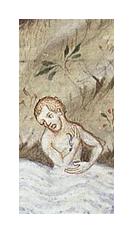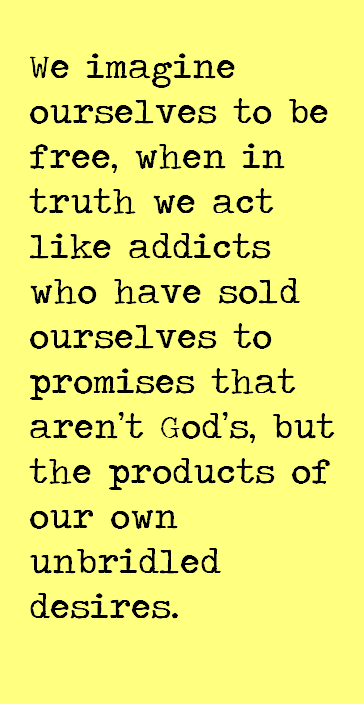How long, O Lord?
Will you forget me forever?
How long will you hide your face from me?
How long must I bear pain in my soul,
this sorrow in my heart day and night?
How long will my enemy triumph over me?
Look on me and answer, Lord my God.
In the book of psalms we encounter voices of exuberant praise and confident teaching, as well as voices of lament and questioning. How long? Four times in Psalm 13 the question rises from the heart to the heavens, and there is no answer, only this outpouring of a longing to be remembered, noticed, heard, and answered. How long, O Lord? How long until I can come to you once again with songs of joyful praise?
We don’t know. All we do know is to let the questions rise with honesty, seeking answers, waiting for answers, knocking on heaven’s door, day and night. Prayer born of gratitude flies up like a bird, but when prayer is little more than painful longing, the night can be long, much longer than it was for those Chilean miners. And sometimes the moment when we have to put on sunglasses because the light of day is so much brighter than what our eyes have gotten used to, sometimes that moment doesn’t come.
We pray fervently that our friend will be cured of cancer and live, and the battle is fierce and long, but the moment doesn’t come and she dies, too young.
We pray for an end to violence and war, but the past has a powerful hold on the present, and the moment doesn’t come, and people young and old continue to die on battlefields, in their own homes, and in the streets of our cities.
We pray, and sometimes we wonder if perhaps we should be less bold in our prayers: lower our expectations to reduce the impact of the disappointment, only ask for patience and the strength to take whatever life throws at us? Or we stop praying altogether. If we don’t get our hopes up, perhaps we don’t fall so hard?
Jesus told the disciples a story about a judge and a widow. A widow in Jesus’ time was in a very vulnerable position. When her husband died, all his belongings became the property of his sons or brothers, and she depended entirely on them for her survival. They had certain responsibilities, but that didn’t necessarily mean they took them seriously; disputes involving widows and orphans were quite common. It was the judges’ responsibility to help resolve those disputes in the community.
Moses had charged Israel’s judges saying,
Give the members of your community a fair hearing, and judge rightly between one person and another, whether citizen or resident alien. You must not be partial in judging: hear out the small and the great alike; you shall not be intimidated by anyone, for the judgment is God’s. Deuteronomy 1:16-17
Now this widow had Moses and the prophets on her side, but the judge ignored her. He was a man without shame. Didn’t want to hear her case. Pretended she wasn’t there. Expected her to go away. Ignored her plea for justice. And she had nowhere else to go. No friends in high places, no advocate. All she had was this remarkable capacity to make a scene, and she made good use of it.
She didn’t go away. She stood outside the courtroom shouting, “Give me justice.” She knocked on his door, “Give me justice.” She caught him on the street on his way to lunch, “Give me justice.” She left messages on his answering maching, “Give me justice.” She even followed him to the golf course, shouting, “Give me justice.” She was unrelenting, untiring, insistent and shameless.
And she finally wore him down. Not that the judge suddenly discovered he had a conscience or reverence for God or respect for others, he just wanted to get her off his back. He finally did the right thing – for the wrong reasons, but still, he did the right thing. Now, Jesus said, if the worst judge you can possibly imagine will respond to a persistent widow’s plea, how much more will God grant justice to you, God’s beloved children, who pray night and day? Will God delay long in helping you?
Luke says, Jesus told us this story about our need to pray always and not to lose heart. To pray not with an eye on the clock or the calendar, but trusting in God’s desire for justice and God’s faithfulness. To pray boldly and tirelessly. To pray as if the coming of God’s reign depended on nothing but our prayers. To let our longing for righteousness and peace rise from our hearts to the heavens, asking, seeking, knocking with unrelenting persistence.
I read this great little story about the day that Mother Teresa went to visit Edward Bennett Williams, a legendary Washington attorney who was the lawyer for Frank Sinatra and Richard Nixon, among others.
Mother Teresa came to his office on a fundraising tour for an AIDS hospice. Williams was an influential member of the Knights of Malta, and she came to ask for a contribution. Before she arrived, Williams told his partner, Paul Dietrich, “AIDS is not my favorite disease,” whatever that was supposed to mean. They were looking for a way out and they rehearsed a polite refusal: they would hear her out but say no.
She came in. Little nun. Williams, the man to see. Between them, an enormous desk,immovable as a rock. She made her pitch, and Williams apologetically, but firmly, declined.
“Let us pray,” said Mother Teresa and bowed her head.
Williams looked over at Dietrich, and the two men bowed with her. When she was done, she made exactly the same appeal. Again, Williams politely declined.
Once more Mother Teresa said, “Let us pray.”
Williams looked up at the ceiling. “All right, all right,” he said, and pulled his checkbook.[1]
Parts of this story resonate with Jesus’ parable. Know what you want and go after it. Pray with the insistence of this little nun. Pray with the doggedness of this widow.
But there’s another dimension to Jesus’ story. It is quite a privilege to worry about the state of one’s prayer life while widows worry about food, housing, and affordable health care. You see, the widow in the story isn’t just an illustration for good prayer habits, she’s also alone in her struggle for justice. She’s crying out not just to move a judge who cares nothing about God or neighbor, but to move you and me. She makes a scene to remind us that God’s reign of justice is a future we await with great longing and also a present reality whenever we allow God’s compassion and mercy to rule our actions. She needs us to pray like her, but she also needs us to pray with her, and to help her wrangle justice from corrupt human institutions.
Yes, the night of waiting can be long and we must be persistent in prayer to keep the flame of hope alive and to nourish our faith. We need prayer to remember that our dignity and the dignity of our neighbors is rooted in God’s justice, not in the countless forms of human injustice. Prayer has the power to let the priorities of God reorder the priorities of our lives. Prayer is two-way communication. Yes, we cry out and we are bold in claiming God’s promises for us and for the life of the world. And we ask how long, and we seek answers with honesty, and we knock on heaven’s door. And when we keep at it, the longing that rose from our hearts, returns.
That’s what happened to me. I prayed that little story. I sat with it and turned it round and round in my heart, and then it turned my heart around and God came to me in the widow – persistent, unrelenting, determined to get my attention, asking questions, seeking me, knocking on my door, challenging me to respond to the presence of God’s reign in Christ.
“How long will you hide your face from me,” she asked. “Look on me and answer. How long will children in this city go to sleep hungry? How long will old women cut their pills in half so they last till the end of the month? How long?”
Prayer is two-way communication. Prayer has the power to let the priorities of God reorder the priorities of our lives.
The world is changing in ways we struggle to understand and at an unprecedented pace; everything happens so fast that our souls can’t keep up. It would be tempting to seek a spiritual life that simply helps us to keep our head above water and breathe. Something to give us the strength of heart not to fall behind in the crazy rush. Something to assure us of God’s love in a world that’s going everywhere at once and nowhere. But that kind of spiritual life wouldn’t go deep enough.
We need prayers that allow us to take our needs and questions to God and that open us to God’s persistent, unrelenting, questioning presence. We need prayers that remind us that Christ has claimed us as citizens of the kingdom.
[1] Evan Thomas, The Man to See: Edward Bennett Williams (New York, NY: Touchstone, 1992) p. 390











